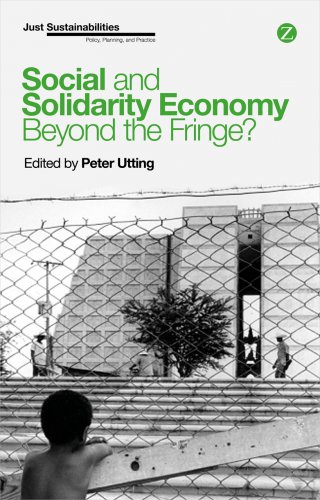As economic crises, growing inequality and climate change prompt a global debate on the meaning and trajectory of development, increasing attention is focusing on ‘social and solidarity economy’ as a distinctive approach to sustainable and rights-based development.
While we are beginning to understand what social and solidarity economy is, what it promises and how it differs from ‘business as usual’, we know far less about whether it can really move beyond its fringe status in many countries and regions. Under what conditions can social and solidarity economy scale up and scale out – that is, expand in terms of the growth of social and solidarity economy organizations and enterprises, or spread horizontally within given territories?
Bringing together leading researchers, blending theoretical and empirical analysis, and drawing on experiences and case studies from multiple countries and regions, this volume addresses these questions. In so doing, it aims to inform a broad constituency of development actors, including scholars, practitioners, activists and policy makers.
Purchase Social and Solidarity Economy: Beyond the Fringe
Table of Contents
Introduction: The challenge of scaling up social and solidarity economy
PART I: History, theory and strategy
• Social and solidarity economy in historical perspective
Jean-Louis Laville
• Prometheus, Trojan horse or Frankenstein? Appraising the social and solidarity economy
John-Justin McMurtry
• Beyond the business case: a community economies approach to gender, development and social economy
Suzanne Bergeron and Stephen Healy
• Can social and solidarity economy organisations complement or replace publicly traded companies?
Carina Millstone
• Scaling the social and solidarity economy: opportunities and limitations of Fairtrade practice
Darryl Reed
• The potential and limits of farmers’ marketing groups as catalysts for rural development
Roldan Muradian
• Institutionalising the social and solidarity economy in Latin America
José Luis Coraggio
• Rebuilding solidarity-driven economies after neoliberalism: the role of cooperatives and local developmental states in Latin America
Milford Bateman
• Enabling the social and solidarity economy through the co-construction of public policy
Marguerite Mendell and Béatrice Alain
PART II Collective action and solidarity in practice
• Beyond alternative food networks: Italy’s solidarity purchase groups and the United States’ community economies
Cristina Grasseni, Francesca Forno and Silvana Signori
• Social and solidarity investment in microfinance
Paul Nelson
• Balancing growth and solidarity in community currency systems: the case of the Trueque in Argentina
Georgina M. Gómez
• State and SSE partnerships in social policy and welfare regimes: the case of Uruguay
Cecilia Rossel
• Extending social protection in health through SSE: possibilities and challenges in West Africa
Bénédicte Fonteneau
• Enabling agricultural cooperatives in Uganda: the role of public policy and the state
Justine Nannyonjo
• Embeddedness and the dynamics of growth: the case of the AMUL cooperative, India
Abhijit Ghosh
• Taking solidarity seriously: analysing Kerala’s Kudumbashree as a women’s SSE experiment
Ananya Mukherjee-Reed
• Demonstrating the power of numbers: gender, solidarity and group dynamics in community forestry institutions
Bina Agarwal
About the Author:
Peter Utting is international coordinator of the Center for Social Economy (Centro para la Economía Social or CES), based in Nicaragua, and a senior research associate of the United Nations Research Institute for Social Development (UNRISD). Until August 2014 he was the deputy director of UNRISD, where he coordinated international research projects on social and solidarity economy and corporate social responsibility. He was instrumental in establishing the United Nations Inter-Agency Task Force on Social and Solidarity Economy in 2013. Recent publications include Business Regulation and Non-State Actors: Whose Standards? Whose Development? (co-edited with Darryl Reed and Ananya Mukherjee-Reed, 2012), The Global Crisis and Transformative Social Change (co-edited with Shahra Razavi and Rebecca Varghese Buchholz, 2012) and Corporate Social Responsibility and Regulatory Governance (co-edited with José Carlos Marques, 2010).





